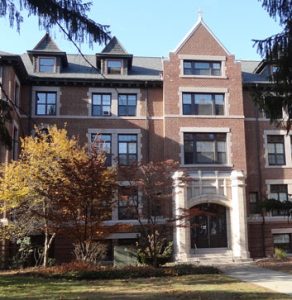
Home is where social justice is: and affordable housing programs are capable of offering residents with basic needs, as well as empowering social services. Housing is a family issue. As I follow new policy circumstances surrounding the prohibition of federal funds creating access to affordable housing and President-elect Trump’s impact on homelessness, it is time to look at how housing support programs can work. I volunteer at Bethany Hill Place, located in South Framingham, Massachusetts. On a campus owned by the Sisters of St. Joseph of Boston, Bethany Hill Place is a public housing residence that has been in existence since 1994. Today it is sponsored by the sisters of St. Joseph of Boston. At Framingham State University’s Center of Academic Success and Achievement, I am part of a reading buddy program in partnership with Bethany Hill Place.
As a volunteer, I read to children who are at risk—these are children who have a higher probability of failing academically or dropping out of school. The kids I work with are considered more vulnerable because they have experienced situations such as homelessness, violence, addiction, and loss. Bethany Hill provides them with safe and affordable housing.
Bethany Hill Place serves about 150 individuals and families each year, with 41 units in a mix of studios ranging in 1-4 bedroom apartments—including some that are wheelchair accessible. They provide parking and laundry facilities; they have a community room, computer center, playroom, as well as an on-site management office, wheelchair-accessible units, playground, basketball court and community gardens: all of these things are essential for a family to support themselves, get back on their feet, and thrive.
Bethany Hill offers a place people can call home, and that is definitely a start. But the rest of what they do means that people can move forward: They focus on education, teaching skills, and providing the tools necessary to acquire a job. This kind of affordable housing program can lead to something more because of the community focus.
The focus underlines their values: Bethany Hill works with families trying to achieve academic success and educational goals to obtain housing. Within the housing unit, they offer learning opportunities for both the children and the parents that reinforce the idea of achieving and pursuing a successful future. The Bethany Hill model guides residents to set individualized learning goals and encourages residents to get involved in their own education so they can move their life forward by taking advantage of the multitude of programs offered by the community.
How does this work? Each resident works with a member of the Bethany Hill staff to explore, set, and work towards their educational goals. They understand that education is a broad category: Bethany Hill offers workshops on life skills, financial literacy, wellness and job preparation, and a Parent Café for parenting support and education. The resources closely related to traditional ideas of education include individual college and career counseling, tutoring on GED and ESOL. In addition to these resources, they provide training on basic skills, access to scholarship programs, computer instruction with open access to a computer lab, and youth programs such as summer camp and one on one tutoring. They also offer social and recreational activities aimed at community-building, case management, advocacy for HIV/AIDS, and scattered site homelessness prevention programs. Just providing a list of things Bethany Hill does makes it clear how dynamic the idea of affordable housing can be. As valuable as this is, much of this relies on the 74 volunteers who help. Bethany Hill’s paid staff: six people.
This adds up to progress and a fresh start for homeless and low-income families. Residents have questions such as, “Where do I go from here?” and “How do I get to where I need to be?” Without a place to start, without many helping hands, these questions could not be raised, much less answered. So, it’s true: Bethany Hill is a low-income housing arrangement structured around the vision of what education can do for people in the future—and the resources involve much more than a roof and a ride to school.
Tasia Clemons is a Junior sociology major at Framingham State University, a resident assistant, and a CCF Public Affairs Intern.

Comments